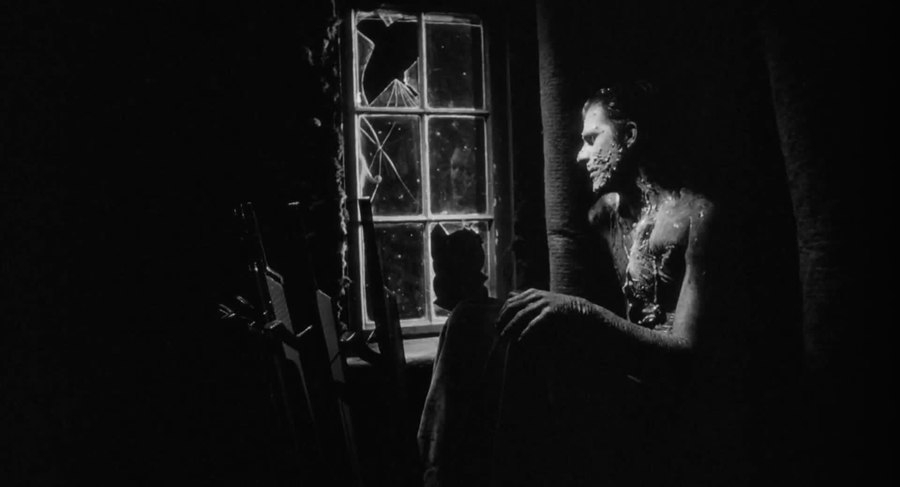US | 1977 | Directed by David Lynch
Logline: In a surreal landscape an angst-ridden man tries in vain to keep his family and his sanity together.
From the tenebrous squelch and stickiness that throbs and flows between the psychological and the physiological, is the inner cosmic debris that fills the realm of Eraserhead. To David Lynch, its auteur, it is whatever you make of it, for he is not prepared to offer anything more than “A dream of dark and troubling things”. So then, let Eraserhead be Eraserhead is Eraserhead was Eraserhead.
I first saw this inexplicable excursion into weirdness in the mid-80s, late at night on British television with my father when I was barely sixteen. It was a small screen in a small room that only exacerbated the movie’s claustrophobic atmosphere. The movie lingered in my mind like a dank mould, but one with curious spores. It grew into a morbid fascination; the mood and tone, the sounds and imagery, and The Man in the Planet; I loved those huge gears, that ominous window, his horribly scarred face, his enigmatic role in the giant stormy scheme of things … and of course, Henry’s baby. That hideous thing gave me the pleasure of nightmares.
Henry Spencer (Jack Nance) lives within an industrial wasteland. Perpetually depressed, suicidal even, he lusts after The Beautiful Girl Across the Hall (Judith Roberts), who tells him he’s been invited to dinner with Mary X (Charlotte Stewart) and her parents, Mr. X (Allen Jospeh) and Mrs. X (Jeanne Bates). This is the woman he had sex with. Or was that in his tortured mind? At dinner Mary’s parents serve up tiny artificial chickens in the midst of awkward conversation, and they chastise Henry for his lack of duty.
Back in their cramped apartment Henry and Mary deliberate over responsibility for their newborn mutant baby, that cries incessantly. Henry would prefer to visit the Lady in the Radiator (Laurel Near) rather than feed the ghastly offspring. Mary leaves him, and in his despair he dreams of his head being drilled for use on the end of pencils. He sees The Beautiful Girl Across the Hall being intimate with Mr. Roundheels (Jack Walsh), and the baby cackles at Henry, seemingly laughing at his utterly pathetic existence.
David Lynch made Eraserhead in the same way Peter Jackson made Bad Taste, over a period of four or so years. Like Jackson, Lynch handled many of the key roles, writing/directing/co-producing/production design/art direction/editing/original music. Its original title was Gardenback. In Serbia it is called Chapter for the Removal, in Italy it is The Mind That Erases, and in France it became known as Labyrinth Man.
The monochromatic cinematography, courtesy of original lensman Herb Cardwell and his replacement Frederick Elmes, is brilliant and menacing, as is the sound design, courtesy of Alan R. Splet (and Lynch). But most memorable is the animatronic effect of the mutant baby. To this day Lynch refuses to explain how he achieved it, although rumours persist that it was an embalmed calf! The creation is an astonishing manifestation of everything infantile, domestic and familial, yet shockingly, disturbingly alien.
With a smirk Lynch slyly describes Eraserhead as his “most spiritual movie”. Indeed it is a wildly existential movie that tackles metaphysics with abstract thought, it wrestles sexuality with introversion, wrangles loneliness and despair with a deep-rooted freaky control. It has a fascination with orifices; the camera is forever entering and exiting holes, like some kind of descent into a sexual phantasmagoria. Some of these entrances and exits are metaphors, while others are purely narrative tunnels.
Few films are able to capture the elusiveness of oneirodynia (or nightmare logic, if you will) with such a distinct and wholly original style; a mise-en-scene that threatens to consume itself, a narrative arc that coils and threshes with ferocity and tranquility in equal measure.
It was after viewing the movie during its initial “midnight movie” circuit that Mel Brooks gave Lynch the job of directing The Elephant Man, while Stanley Kubrick and John Waters were two of the movie’s earliest high-profile champions.
With Eraserhead Lynch had tapped into the oiliest reserves of his inner primordial hell and forged a magnificent monster … but not to worry, because in Heaven everything will be fine.





